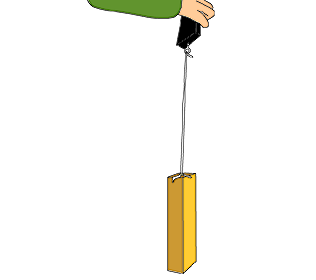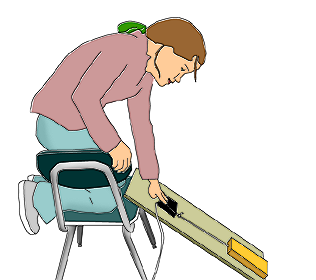 | ||
| || home ||| units ||||| help | ||
| All Units | > | Unit 7 - Levers and machines | > | Investigation 1 - Levers, pulleys, and inclined planes, Oh My! | > | Trial 3 |
Trial 3 - Lifting Wood
-
An inclined plane, a fancy word for
a ramp, is a slanted surface used to raise
an object. The inclined plane permits you to
overcome a large amount of force
(resistance) by applying a relatively small
force through a longer distance to raise the
object or load. Think about places that an
inclined plane would be helpful. Make a list
of common uses of inclined planes. Be
prepared to share your thoughts with class.

-
Let's try lifting a block of wood a
certain distance. First, you will lift a
block of wood straight up. Place a screw
hook into the end of wooden block. Attach a
10 cm of string to the hook and connect the
force sensor to the other end of the string.
Measure the distance between the floor and
the seat of a chair with a meter stick.
Record the distance.
-
Zero your force sensor. Refer to Technical Hints to zero the force sensor.
-
Start data collection. Refer to Technical Hints to record a single measurement. Lift the block of wood from the floor to the seat of the chair. Stop and save your graph. Refer to Technical Hints to save your graph.

-
Place a wooden ramp on the floor
with one end resting on the seat of the
chair. Measure and record the length of the ramp.
-
Place the wooden block attached to the force sensor on the ramp.

-
Zero your force sensor. Refer to Technical Hints to zero the force sensor. Start data collection.
-
Refer to Technical Hints to record a
single measurement. Lift the block of wood
on the ramp from the floor to the seat of
the chair. Stop and save your graph. Refer
to Technical Hints to save
your graph. Be prepared to share your data
collection results with the class.
 |  |  |
Copyright 2005 The Concord Consortium, All rights reserved.